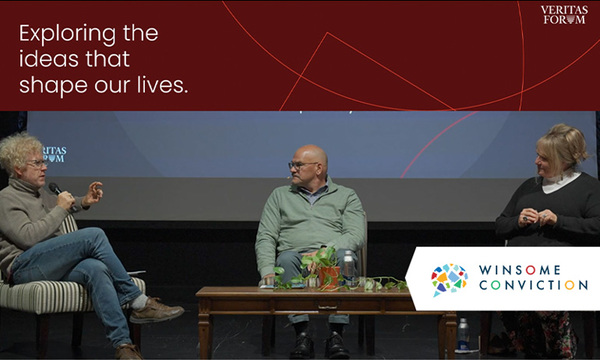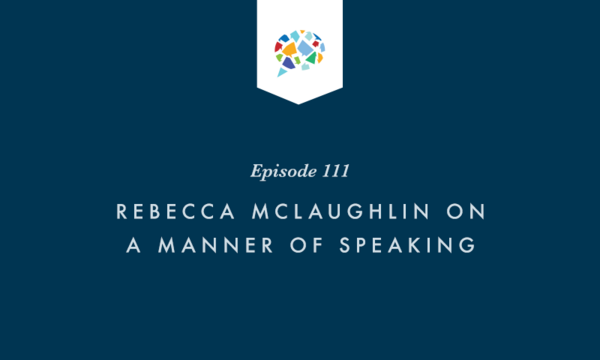
Tim and Rick continue the discussion on the three waves of feminism with Dr. Julia Wood, noted gender theorist and leading communication scholar. In this episode, they discuss how women in the third wave of feminism were key beneficiaries of first and second wave feminism, but they were doing things differently. Dr. Wood addresses two key developments with the third wave of feminism – intersectionality and building alliances. The discussion also draws out the importance of understanding a person’s backstory and the problems of painting styles of thought with too broad a brush. This is part 2 of a 2-part conversation with Dr. Julia Wood on feminism. Listen to part 1 of this conversation.
Transcript
Julia Wood: And that's... a movement is made up of so many different voices and they aren't all singing from the same hymn book. They're singing different songs. They're singing in different voices. And so what you get, what coalesces, what sifts out after all this, is what keeps you in you take to the next step, but it takes all of that in the mix to figure out what the possibilities are.
Tim Muehlhoff: Welcome back to the Winsome Conviction podcast. My name is Tim Muehlhoff. I'm a professor of communication at Biola University and co-director of the Winsome Conviction Project. And my co-host, Dr. Rick Langer is with me as well.
Rick Langer: Thanks, Tim. As Tim mentioned, I'm a co-host with Tim and co-director of the Winsome Conviction Project. I'm also a professor in the Bible department here at Biola University and the director of the office of faith and learning.
Tim Muehlhoff: And we're co authors of a brand new book called Winsome Conviction: Disagreeing Without Dividing the Church. Please make note that my name comes first.
Tim Muehlhoff: We are doing a segment here on the Winsome Conviction podcast called Coming Up to Speed. We feel like a lot of huge topics. We don't get a lot of the backstory. We don't get a lot of the history. So we did one on politics. We did one on race, and if you've listened to the first segment of this, we did it on feminism with Dr. Julia Wood. She's one of the most noted gender theorists out there. She's won a million awards, has published extensively in the area of feminist thought, as well as gender.
Tim Muehlhoff: We had her on the first one and talked about the three waves of feminism, which was a fascinating backdrop to how we think about feminism. She talked about the first two waves, and then we moved into the third wave. So what you're about to hear is Julia describing the third wave. And then we get a chance to ask her about some quotes that we came across, and I think you'll find her responses fascinating. So let's jump back into our interview with Dr. Julia Wood in the third wave of feminism.
Rick Langer: So give us a quick description of third wave feminism, key issues, key theories, please.
Julia Wood: It was in the late 80's that we began picking up some rumblings from younger feminists or younger women that were doing some different things from the second wave feminism that I came of age with. And these women call themselves feminists, but they were doing it differently. It really started with the riot girls, which is this great girls band in the late 80's. And some of their lyrics were very pro women, strong women, things like that. And these women were like the women in the second wave in that they had had, they were the beneficiaries of two waves of feminism, but they could see what else needed to happen. And one of the key pro side, I guess the two things that most impressed me about the third wave is one, they focuse on what they call intersectionality.
Julia Wood: And that is that you can't... You're not just a woman. I'm not just a woman. I'm also a white woman. I am a straight or heterosexual. All of those are parts of my identity and someone who's black and a woman is in some ways different than I am, someone who's lesbian and a woman is different than I am so that these parts of our identity intersect. And then we just pull out one and say, we're going to look at gender. We kind of blur things in a way that reduces the complexity of them. So they have really been fighting the battle to recognize this intersectionality of identity. And that really leads to their second.
Julia Wood: The second thing I most admire about them is the way they're building alliances. So one of the key ideas that the third wave has is you cannot be against racial discrimination if you're not also against discrimination against women. And if you're against those two, you have to be... against discrimination, against LBTQ people because all of these oppressions are wrong. And so they are building alliances among these groups that have been oppressed instead of saying, okay, I'm going to fight my battles and y'all fight yours. And that's really impressive to watch.
Rick Langer: And if you were to summarize the concerns and different, well, so let me ask, is there a conceptual difference in terms of how they think about, I don't know how to put it, about being a woman, as opposed to in the first two waves, or perhaps how women stand in relation to men?
Julia Wood: I don't think they think about to leave good interview a third wave feminists get this really clear. But from my perspective, they don't think about being a woman in those terms, they think about being a Chicano woman or a Latinix or a white woman or a lesbian woman. So, I mean, they don't see their identity is one slot.
Tim Muehlhoff: Yeah, that reminds me of Maria Lugones, her world traveling. Yeah. How she's been constructed in different, well, you said intersectionality, but how she is constructed every time she moves into a different place or a sphere or different people, she has to learn what that reconstruction looks like and adapt to it, resist it, whatever. And she calls that world traveling. I thought that's a really nice way of looking at it.
Julia Wood: It's a wonderful term. And if you were to go to different places and let yourself be subjected, as she is to that kind of definitions of view, you would begin to see in certain contexts, your Christianity stands out or your masculinity stands out or your whiteness or some aspect of... But they're all mixed in there. And they all contribute to not only who you are, but also to what opportunities and lack of opportunities you have in life.
Tim Muehlhoff: And that's great to know a person's background. It's great to... We do faculty dual logs here. Rick and I have been bringing Biola faculty together to talk about a bunch of different issues. And the first thing we do is we have dinner with all the participants to hear their backstories. And that is the intersectionality part of it is I'm this, but I'm this because of this. And so don't think I'm just a rank and file this because... But I'm this because of how my parents interacted with this issue. And so that is such good information to have, as you're conversing with the person.
Julia Wood: And I think the first waves and second waves didn't get that very thoroughly. I think they were so interested in fighting for gender equality, that they really obscured the ways in which race, sexuality, and so forth limit and enlarge life choices.
Tim Muehlhoff: Of course.
Rick Langer: Let me just ask you Julie, to respond a few quotes. You mentioned this, you know, before we started the podcast. When it came to third wave feminism, there were certain parts with the... to me, do seem somehow fundamentally different in terms of the perception of how people are viewing, what it means to be a woman or woman in relation to men. And I'm sincerely curious about what your thoughts about some of these quotes to be. And just so you know, these are things that came from two different social justice reader textbooks that I had. I was part of a social justice reading group. We were doing here at Biola. We were exchanging texts from people with pretty different orientations on this, but, you know, what are some of the books we have? One of them was one I had from when I was teaching and had also been doing my PhD work at a large secular research institution.
Rick Langer: But these were things that brought me up short. I'll just be honest. And I think they also bring a lot of other Christians up short that make them feel problematic about some of the current currents in feminism. So that's the backdrop of this. This is a quote from article by Jeffner Allen on motherhood, the annihilation of women. And here's what she writes:
Rick Langer: I would like to affirm the rejection of motherhood on the grounds that motherhood is dangerous to women. A mother is she, whose body is used as a resource to reproduce men in the men of the world... in the world of men understood as the biological children of patriarchy and is the ideas and material goods of patriarchal culture. Motherhood is dangerous to women because it continues to structure within which women must... in which female, this is interesting phrase, within which females must be women and mothers. And because it denies to females the creation of subjectivity and world that is open and free.
Rick Langer: How does that, how do you read that... And how do you respond to that? Does that sound like a good vision of feminism and understanding women? Or is there something in that you find tension with?
Julia Wood: Well, I think within every wave of feminism, as with other movements for various kinds of social change, you have mainstream and you have fringes. I think the speaker in that particular quote is clearly on a more radical and fringe side. That's not your mainstream third wave feminism. I think it does challenge in some useful ways, the idea that women are to be defined by motherhood and anything else is extra. And I think it's a nice challenge because that does need to be challenged. It's the only way one can be in the world. But most third wave feminists I know, plan to already have had children. They did so joyously. They did so deliberately. Just as the women in the second wave were told feminists are man-hating. Well, most feminists in the second wave weren't man hating. They were, most of them were more like me, I married a man. I love the man. I love my sons. I love students like Tim Muehlhoff. There wasn't man-hating, but there was...
Rick Langer: Now Julia. Now you're sucking up to my co-host. I just really can't let that go.
Julia Wood: Yeah. He was my greatest achievement. What do you expect me to...
Rick Langer: Yeah, I get it. And I suppose that's true. I suppose that's true.
Tim Muehlhoff: But Julia, that's another communication tip. I think we need to point out is you need to situate people where they are on that spectrum and today's argument culture does a great job of surveying the left and the right, and they get the most provocative and this isn't... Rick isn't searching. This was in a textbook. I mean, this is...
Tim Muehlhoff: [crosstalk 00:11:17]
Rick Langer: I have another one. I think that a pure, this is from a philosophy. So my PhD isn't philosophy. And this is from APA newsletter thing that I got. This is 25... Well, yeah, I don't want to admit how many years ago this was, but anyhow, it would have been in the late 90's, probably. I think that by appearing as a bearded lady, I helped break down stereotypes about what it means to be female and make it visible in a way in which men and women merging on the physical level.
Rick Langer: In my case, to refuse the beard is to refuse to take seriously my responsibility help end sexism. And I remember when I read that just being struck by... that men grow beards, an artificial function of sexism, or is this a reflection of biological facts of human beings that men grow facial hair post puberty in ways that women did not. It's again, generalization because obviously this woman could grow a beard. She talked about combing croissant crumbs out of her mustache. So it's a meaningful beard that she can grow. These were some of the things that just strike me as... Are we trying to dismantle too much at these moments? And again, I wasn't looking for them. These were just things that I bumped into in the course of reading that gave me these weird aha moments.
Julia Wood: Well, I'm going to pull over at Tim said a minute ago. I mean, somebody whoever is giving you these, just they're pulling particularly provocative comments. And I think they are useful because they do provoke and provoke is a good word. We always provoke some thinking. The fact that a woman has a beard, some women has more hair on their face. Does that make her not a woman? I mean, let's question that.
Julia Wood: Just like the fact that a while back, it wasn't so long ago that it was very weird to see a man with an earring. Ooh, what was wrong with him? You know, okay. Well, some men started doing that just to sort of check the stereotype. Most women aren't wearing beards, but a lot of women have said I'm not wearing makeup anymore. Yeah. But I'm not going to say I'm going to put on a face so that I look better for you and better for the world. That's not my job. This woman's just taking it a little farther. And I see it as a useful kind of an experiment, but it's up again, it's on the edge, but edges are so interesting because they help redefine what's in the middle.
Rick Langer: Yeah. And so that's where it's going to say it... I don't necessarily that the thing that I like to get clear on when we think about this is how do we view this? Is this something where you push the edge and because you're exactly right? Those are the things that often help you understand. So these are the boundaries. Now we know where the playing field lies or are we saying this is meant to be the playing field? And of course, when you read the person who's writing this, I think oftentimes the people do want it to be the playing field, but that doesn't... It's dangerous to assume. Therefore, everyone who would be considered a feminist is advocating for these sorts of things. I just sincerely... It's helpful to talk and say, talk to me about this. Is this a thing that you see mainstream? Is the thing you see more on the edge? And that is different than asking, is it valuable or certainly I'm asking, should people not be able to say things like that. Because I think it's really instructive to mark it out.
Julia Wood: Oh no. And I've always thought that, although that your speaker or writer in that case may really want that to be the mainstream playing field. It's not. She knows it, but I am so grateful to her because she's moved to mainstream playing field that I'm on a little bit more in this way. And that's... a movement is made up of so many different voices and they aren't all singing from the same hymn book. They're singing different songs, they're singing in different voices. And so at what you get, what coalesces, what sifts out after all of this is what keeps you to you take to the next step, but it takes all of that in the mix to figure out what the possibilities are.
Rick Langer: And it takes a lot of intellectual nuance to be able to read these things and say, wait a minute, to maintain the difference between because this person says this, therefore everyone says that. Is this representative of the middle? Is this an exception? Where does that lie? And it's hard because we like single definitions to single words. We like to people fit, people's labeled under that word and want to have everything they say to be representative of the broader group. And that just isn't true. And that is absolutely toxic to most for conversations when we, you know...
Rick Langer: [crosstalk 00:16:00]
Julia Wood: When you we totalize people or movement or anything, it just, it just sort of stunts thinking which is not very helpful.
Tim Muehlhoff: Yep. You know, let me just read a quote real quick from Pat Robertson who win the feminine mystique. It was the 50th anniversary of it. And this quote went everywhere. And this is what we're talking about that we just have to be so careful not to paint broadly based on certain quotes. So this is what Pat Robinson said when asked about the feminine mystique, "The feminist agenda is not about equal rights for women. It is about a socialist anti-family political movement that encourages women to leave their husbands, kill their children, practice witchcraft, destroy capitalism, and become lesbians." Right?
Julia Wood: Well, there you have it.
Tim Muehlhoff: When I think of Julie, I think witchcraft. That's just... And so synonymous with the two, but that went everywhere and it is so frustrating to be a Christian. And to now have that umbrella out there that, and again, so the right makes this mistake, the left makes this mistake, Christians make it, non-Christians and we just got to stop painting with these brushes. Right, Rick?
Rick Langer: Yeah. That's a great example. And this is so true in terms of how egalitarian our excesses are, so to speak that you find them on both sides and it has the same effect in all cases, which is to destroy actual conversation and hearing.
Julia Wood: And, you know, it's really a kind of laziness, I think, to sort of calm everything together, take the extremes and just throw it out as truth. I mean, you're avoiding the hard work of figuring out the nuances to separating the wheat from the chaff. Oh, all these kinds of things that we are able to do because we have lives. They're avoiding and it's just pure lazy.
Tim Muehlhoff: Well, what a great word and that on Julia would thank you so much for carving out the time to help us get up to speed on an important topic and movement like feminism. And we're just so grateful that you take time and do that. So, Julia, thank you.
Julia Wood: Thanks for the conversation. I enjoyed it.
Rick Langer: It was great to have you Julia, and it's so... such a treat to be able back to talk to you live, and in-person not this filtered through Tim Muehlhoff. So thank you so much-
Julia Wood: You don't trust me.
Rick Langer: ...for joining me. Well, you know, just a little skeptical. It's always good to see the other side, so...
Julia Wood: Good to meet you, Rick. I enjoyed it.
Rick Langer: Thank you. And I'd like to thank all of our listeners for joining us here at the Winsome Conviction podcast. We'd love to have you become a regular listener by subscribing at Spotify or Apple podcast or wherever you'd like to get your podcast. And we also encourage you to check out the winsomeconviction.com website for more research or articles, information on cultivating convictions, folding them deeply and conversing with each other in ways that honor our difference, but avoid dividing our community. That's really what we're all about here. So thanks again for joining us.
 Biola University
Biola University





